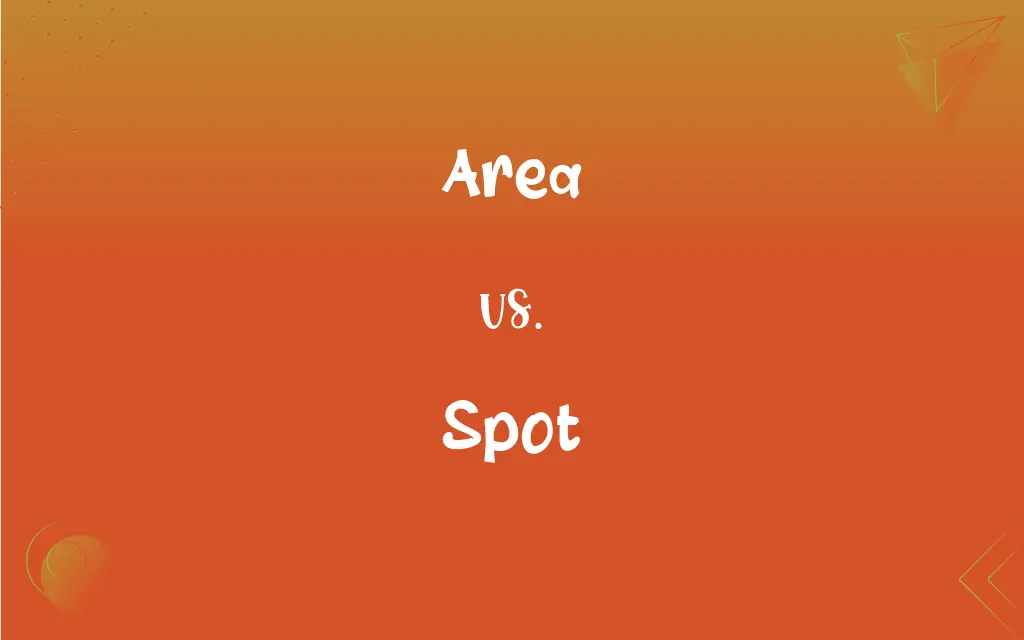Area vs. Spot: What's the Difference?
Edited by Janet White || By Harlon Moss || Updated on November 8, 2023
Area refers to a larger region or space, while a spot is a small, distinct location or mark within an area.

Key Differences
An area is a defined space or region that can be measured and is often related to concepts of size and extent. It's a term used to describe a larger expanse, such as a geographic region, room, or surface. A spot, on the other hand, is more specific and pinpointed; it's a small, clearly defined location or mark, often notable for its distinct features or for being different from the surrounding environment.
When discussing physical spaces, the term area could refer to the entirety of a location, such as a park or a neighborhood, emphasizing its scope. A spot is a more particular portion of that space, like a bench in the park or a specific storefront in the neighborhood. The difference highlights the scale, with 'area' suggesting a broader context and 'spot' indicating a more focused point within that context.
In conversation, when someone refers to an area, they're generally talking about a segment of space without clear boundaries, which can be subjective in size. In contrast, a spot is often a precise point that someone can point to or identify with accuracy. For instance, an area could be a whole section of a beach, while a spot might be where someone has laid their towel on the sand.
The usage of 'area' and 'spot' can also differ in various disciplines. In real estate, an area may refer to a piece of land or property, whereas a spot could be a particular place of interest or value on that property. In art, an area could be a large color field, while a spot might be a dab of paint that stands out.
In technology and science, 'area' can denote a sector or field of study, like the area of artificial intelligence, whereas a 'spot' might refer to a specific problem or point of interest within that field, such as a hot spot for data activity. It's clear that while both terms denote location, the scope and specificity set them apart.
ADVERTISEMENT
Comparison Chart
Scope
Broad region or segment
Small, precise location or mark
Measurement
Quantifiable in square units
Not typically measured by dimensions
Usage
Used to describe larger expanses
Used for specific, often smaller points
Context
Can be subjective or objectively defined
Is usually well-defined or noticeable
Implication
General region, less specific
Specific point, more detailed
ADVERTISEMENT
Area and Spot Definitions
Area
Geographic Region.
The area known as the Mississippi Delta is rich in musical history.
Spot
Particular Point.
The leopard's coat is covered in unique spots.
Area
Surface Space.
The total area of the canvas allowed for a more dramatic composition.
Spot
Small Mark.
She noticed a red spot on her shirt.
Area
Mathematical Term.
The area of the triangle can be calculated using the base and height.
Spot
Specific Location.
Meet me at our usual spot by the fountain.
Area
Living Space.
They moved to a larger area to accommodate their growing family.
Spot
Position of Attention.
The scandal put the CEO in the media spot.
Area
Scope of Subject.
Her area of expertise is medieval literature.
Spot
Immediate Situation.
He was on the spot when asked about the company's finances.
Area
A roughly bounded part of the space on a surface; a region:a farming area; the New York area.
Spot
A mark on a surface differing sharply in color from its surroundings.
Area
A surface, especially an open, unoccupied piece of ground:a landing area; a playing area.
Spot
A blemish, mark, or pimple on the skin.
Area
A distinct part or section, as of a building, set aside for a specific function:a storage area in the basement.
FAQs
Can 'area' refer to a field of study?
Yes, it can describe a particular branch of study or expertise.
Is 'area' a precise term?
'Area' can be precise in math but is often more general in other contexts.
How do you find the area of a shape?
By multiplying relevant dimensions, like length by width for a rectangle.
What does 'area' mean?
Area refers to a region or the extent of a surface or piece of land.
How is 'area' used in mathematics?
In mathematics, area is the size of a surface measured in square units.
Is a 'spot' always negative?
No, 'spot' can be neutral or positive, depending on the context.
Is 'area' often used in geography?
Yes, it is commonly used to describe various regions or spaces in geography.
Can 'spot' mean a blemish?
Yes, it can refer to a small mark or stain on a surface.
What does 'spot' mean?
A spot is a small, distinct area or a particular point of interest.
How do you use 'spot' in a sentence?
"She pointed out a quiet spot in the library for studying."
Can 'spot' be used as a verb?
Yes, it can mean to notice or identify something or someone.
Does 'area' imply a certain size?
It implies a size but is relative; it can be small or large depending on context.
Does 'spot' have synonyms?
Yes, terms like point, mark, or location can be similar in meaning.
Is 'spot' used in transport terminology?
Yes, as in a parking spot or a bus stop location.
What's a 'hot spot'?
A place of significant activity or danger, or a Wi-Fi access point.
Can 'area' be used in sports?
Yes, referring to specific zones, like the penalty area in soccer.
What does it mean to 'spot someone'?
It can mean to lend assistance, like in weightlifting, or to notice a person.
Can 'area' relate to volume?
'Area' is two-dimensional, while volume is three-dimensional.
How do you describe a 'spot' in nature?
As a particular place of interest, like a birdwatching spot.
Can 'area' refer to living space?
Yes, it often describes the size or extent of living spaces.
About Author
Written by
Harlon MossHarlon is a seasoned quality moderator and accomplished content writer for Difference Wiki. An alumnus of the prestigious University of California, he earned his degree in Computer Science. Leveraging his academic background, Harlon brings a meticulous and informed perspective to his work, ensuring content accuracy and excellence.
Edited by
Janet WhiteJanet White has been an esteemed writer and blogger for Difference Wiki. Holding a Master's degree in Science and Medical Journalism from the prestigious Boston University, she has consistently demonstrated her expertise and passion for her field. When she's not immersed in her work, Janet relishes her time exercising, delving into a good book, and cherishing moments with friends and family.































































